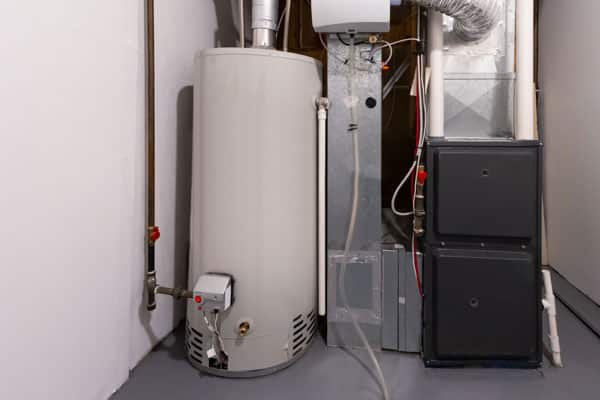Tankless water heaters have become increasingly popular for their energy efficiency, space-saving design, and longer lifespan compared to traditional tank-based water heaters. However, before you invest in a tankless water heater, it’s important to understand how they work, their advantages and disadvantages, and how to choose the right size and fuel type for your household.
In this blog post, we’ll dive deeper into the mechanics of tankless water heaters so you can make an informed decision on whether or not it’s the right choice for your Denver Metro home!
How Tankless Water Heaters Work?
To understand how tankless water heaters work, it’s helpful to compare them to traditional tank-based water heaters. In a tank-based system, cold water enters the tank and is heated by a gas burner or electric heating element. The hot water is then stored in the tank until it’s needed, and more cold water enters the tank to be heated.
In a tankless system, cold water enters the unit and is heated by a gas burner or electric heating element as it flows through a heat exchanger. The hot water is then delivered to the faucet or showerhead on demand. Because there’s no tank, there’s no limit to how much hot water can be delivered as long as the flow rate doesn’t exceed the unit’s capacity.
Here’s a step-by-step breakdown of how a tankless water heater works:
• Cold water enters the unit through a pipe.
• The flow sensor detects the water flow and sends a signal to the control board.
• The control board activates the igniter or heating element to heat the water as it flows through the heat exchanger.
• The unit delivers hot water to the faucet or showerhead.
• When the hot water is turned off, the flow sensor detects the change and sends a signal to the control board to turn off the heating element.
Because the water is only heated when it’s needed, tankless water heaters are more energy-efficient than traditional tank-based water heaters. Plus, they can be installed in smaller spaces and have a longer lifespan since there’s no tank to rust or leak.
Finding Flow Rate
You’ll need to know your flow rate to determine the right size tankless water heater for your home. Flow rate refers to the amount of hot water your household uses at any given time and is usually measured in gallons per minute (GPM).
Knowing your household’s flow rate is important when choosing a tankless water heater, as it helps you select a unit that can provide enough hot water to meet your needs. If you choose a unit with a flow rate that’s too low, you may experience a drop in water pressure or temperature when using multiple hot water appliances at once (such as taking a shower while running the dishwasher). On the other hand, if you choose a unit with a flow rate that’s too high, you may end up overspending on a unit that’s larger than you need.
To find the flow rate of a specific appliance, you can check the manufacturer’s specifications or look for a label on the appliance itself. Then, add up the flow rates of all the hot water appliances in your home. It’s easy to determine the flow rate of a faucet or shower without a label, too. Just find a 1-gallon bucket or container and see how long it takes to fill up with water from the appliance you’re testing. Divide 60 by however many seconds it took to fill the gallon bucket to get your flow rate.
Once you have your total flow rate, you can choose a tankless water heater that meets your needs.
Different Fuel Types of Tankless Water Heaters
Tankless water heaters can be powered by different fuel types, including natural gas, propane, and electricity. Natural gas and propane are the most common fuel types for tankless water heaters, as they provide a higher flow rate than electric units. However, electric units are more energy-efficient and may be a better option for smaller households or homes with low hot water demand.
When choosing a fuel type for your tankless water heater, consider the availability of each fuel type in your area, the cost of installation and operation, and your household’s hot water needs.
Advantages of Tankless Water Heaters
Energy Efficiency and Cost Savings
Tankless water heaters are more energy-efficient than traditional water heaters, as they only heat water when it’s needed. Homes using 41 gallons of hot water or less daily can see 24%-34% more efficiency, which results in lower energy bills. Additionally, tankless water heaters have a longer lifespan than traditional water heaters, so you’ll save money on replacement costs in the long run.
Space-Saving and Convenient
Compared to traditional water heaters, tankless water heaters are much smaller and take up less space in your home. They can be mounted on walls, under sinks, or in other tight spaces. Because they deliver hot water on demand, you never have to wait for a tank to fill up before you can take a shower or do dishes.
Longer Lifespan and Easy Maintenance
Traditional water heaters typically last 10-15 years, while tankless water heaters can last up to 20 years or more. Maintenance of a tankless water heater is less involved because there’s no tank to rust or leak.
Disadvantages of Tankless Water Heaters
Higher Upfront Costs
Tankless water heaters are more expensive to purchase and install than traditional water heaters. However, because they last longer and use less energy, you’ll save money in the long run.
Limited Flow Rate and Hot Water Supply
You may experience a drop in water pressure or temperature if you try to use too many hot water appliances at once with a tankless water heater. However, this can be mitigated by installing multiple units or choosing a unit with a higher flow rate.
Additional Installation Requirements
Tankless water heaters require a larger gas line or higher electrical capacity than traditional water heaters, which may require additional installation costs. Also, if you’re replacing a traditional water heater with a tankless unit, you may need to upgrade your venting system or gas line.
Quality Tankless Water Heater Installation in the Denver Metro Area
There are several advantages to using a tankless water heater to heat your water on demand when you need it versus storing hot water in a tank. Tankless water heaters are more energy efficient, take up less space, and last years longer than traditional tank-based water heaters. Consider your home’s need to determine if a tankless water heater is right for you.
We are Denver Metro homeowners’ trusted partner for professional heating, cooling, plumbing, and electrical services. Our technicians are fully certified and can repair, replace, or install any make or model of plumbing equipment. Reach out today for a tankless water heater quote!


